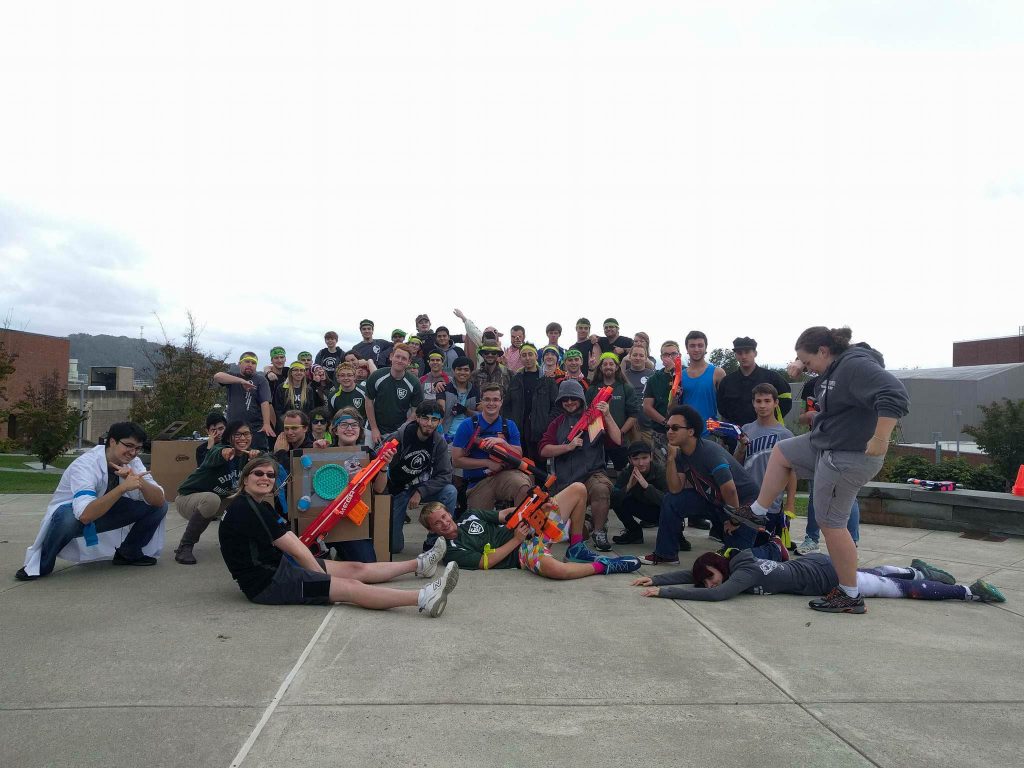
Despite its name, the Zombie Student Association (ZSA) is alive and well on campus.
The ZSA does not fit neatly into its Student Association (SA)-designated category of “cultural club,” but instead spills over into a mix of club sports and gaming. The organization has approximately 20 active members and has shifted its focus since it began as a Late Nite Binghamton activity nearly a decade ago, according to Maggie Hall, secretary of the club and a junior majoring in biology.
“We’ve kind of changed a lot over the years; we’re a cultural club, technically,” Hall said. “We started out a lot with the big zombie craze, so we used to do things more related to zombies. I mean we still do the ‘Humans versus Zombies’ as our big thing … [but] we do a lot more of that and just like Nerf-related stuff as opposed to zombie-related stuff these days.”
The club travels to other colleges in the northeast, including Ithaca College and SUNY New Paltz, for invitationals and also invites other clubs to participate in events at Binghamton University. The ZSA funds its travel with a combination of money from the SA and money raised through fundraisers.
The organization’s biggest event each semester is called a “Weeklong.” During this game, members of the club criss-cross campus completing missions and competing in teams as “zombies,” or students wearing arm bands marking themselves, and humans, with added tasks and clues.
Tyler Rowe, the vice president of the ZSA and a sophomore majoring in chemistry, explained that Humans versus Zombies competitions follow a set of rules but may differ from school to school.
“[Clubs from] different schools go to … [the host] campus and [the hosts] explain however they run the game,” Rowe said. “Different schools have minor variations in however they play, and they’ll be, like, four or five original zombies and however many humans and as the game goes on, the zombies get more and more people until the sides shift and then at the end of the day, the zombies usually win.”
Most members, like Rowe and Hall, were new to the world of Humans versus Zombies before they came to BU, but the club teaches these new members the ropes. Beyond the actual Nerf battles, many members of the ZSA spend time together modifying, or “modding,” their “blasters” — aka Nerf guns.
“A big part of our club I would say is modding blasters, ‘cause you’ve got the thing that Nerf sells and it’s like, ‘Okay, the spring in here is terrible, it, like, falls down onto the ground immediately,’” Hall said.
“We have some [blasters] that the club owns that we give out to people to, like, rent,” Rowe said. “Most members have their own just by, like, necessity. One of our old members even made his own blaster from 3-D printing.”
The ZSA is sponsored by the blaster company Zuru, which sends free blasters to the organization, which then rents them out to members or raffles them off.
Though the blasters and Humans versus Zombies are most closely associated with the club when you see members on campus, the ZSA also hosts other types of battles throughout the year.
“Territories … is like a Nerf war, so instead of Humans versus Zombies … it’s Humans versus Humans, so everyone has blasters and everyone’s firing at each other,” Rowe said.
“Our big thing is Humans versus Zombies and this is different because it’s Humans versus Humans instead of Humans versus Zombies, but it’s still got the same general idea to it, you know, people fighting each other with Nerf,” Hall said.
The club is hoping to expand its on-campus presence to include more events like a recent one modeled after “Escape the Room” and collaborations with campus groups like the Newing College Council. Hall said that the club is looking to change its name to reflect recent changes and this expansion.
“I mean, the club started what, like eight years ago?” Rowe said. “Like that’s when everyone was like ‘Zombies are the huge thing,’ so over time people started getting less and less interested in zombies. We don’t focus on that aspect of the club as much.”


